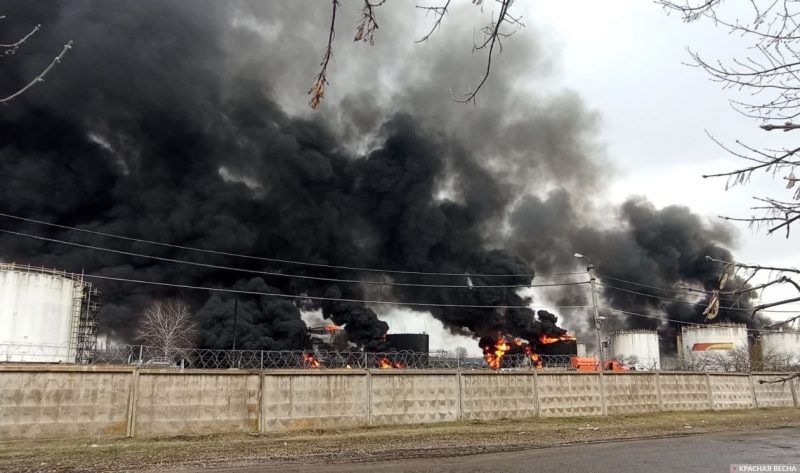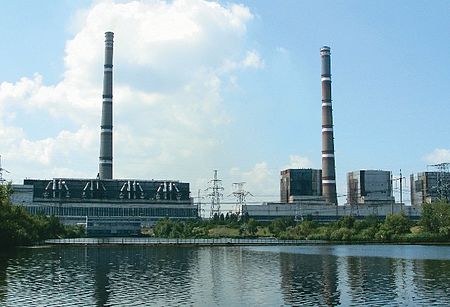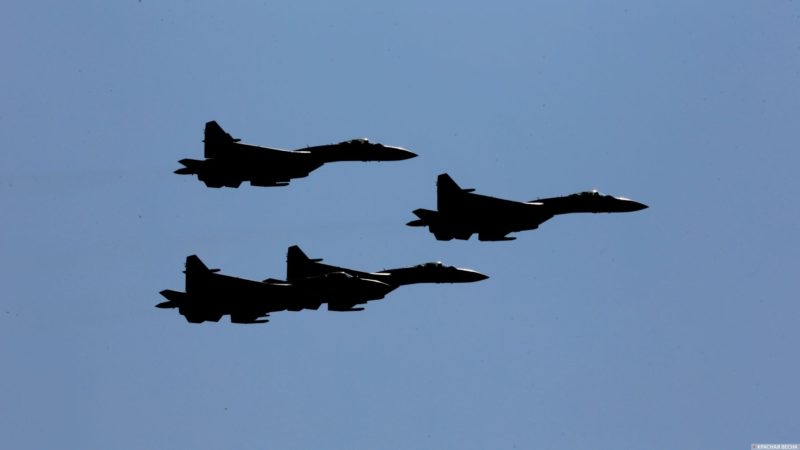01.04.2022, Moscow.
At 5:30 a.m. on April 1, two Ukrainian Air Force Mi-24 helicopters entered Russian airspace at an extremely low altitude and carried out an air strike on an oil depot on the outskirts of Belgorod.
Immediately after the strike, a fire broke out at the oil depot belonging to the Rosneft company. Eight of the 24 multi-ton fuel tanks caught fire.
No one was injured as a result of the attack (during the first hours there were reports of two injured workers at the oil depot, later denied). Residents of houses in the immediate vicinity of the oil depot were evacuated.
In the first hours, 170 rescuers from Belgorod worked at the site, later rescuers from Kursk colleagues joined them. In total 300 people and about 100 pieces of equipment were involved in extinguishing the fire, including a fire train and a helicopter.
The fire was given the first level of danger, the area of the fire was 1.2 thousand square meters. By noon, three of the eight burning tanks were extinguished. By 5:00 p.m., the fire was isolated and the burning area was reduced.
Defense Ministry spokesman Igor Konashenkov stressed that only civilian vehicles were supplied with fuel from this facility. The tank farm has nothing to do with the Russian Armed Forces.
According to Rospotrebnadzor (Federal Service for Surveillance on Consumer Rights Protection and Human Wellbeing), the maximum permissible concentration of harmful substances in the air did not exceed the permissible values.
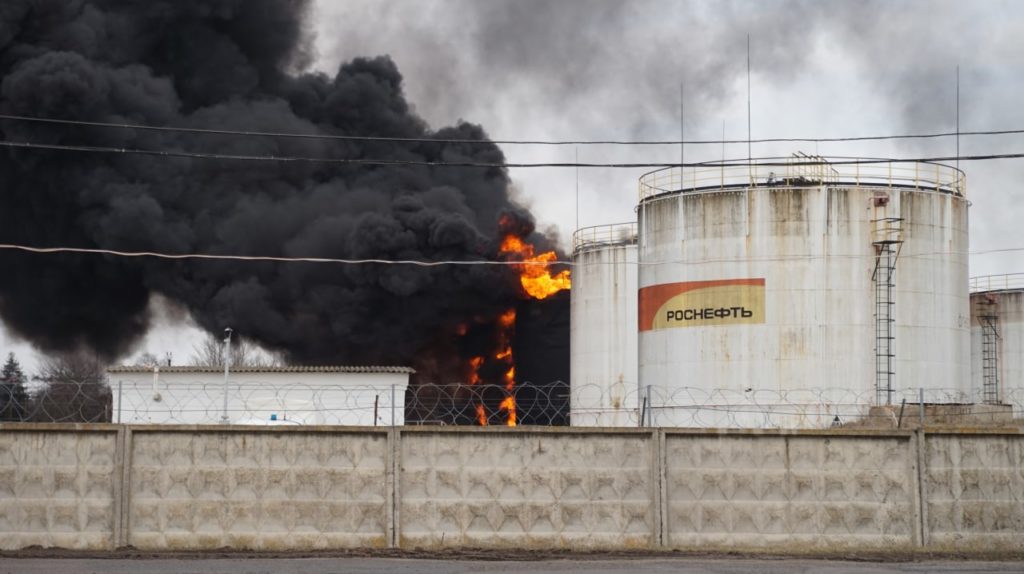
Aleksey Bobrov © Rossa Primavera News Agency
How could this happen?
Presumably the helicopters entered Russian airspace from the northwest of the Kharkov region, which is currently under the control of the Ukrainian army.
When flying at extremely low altitudes, the helicopters become invisible to air defense radars because they are below the horizon line and terrain.
Some experts remind that Mi-24 helicopters are also in the Russian army and could be recognized as Russian owns.
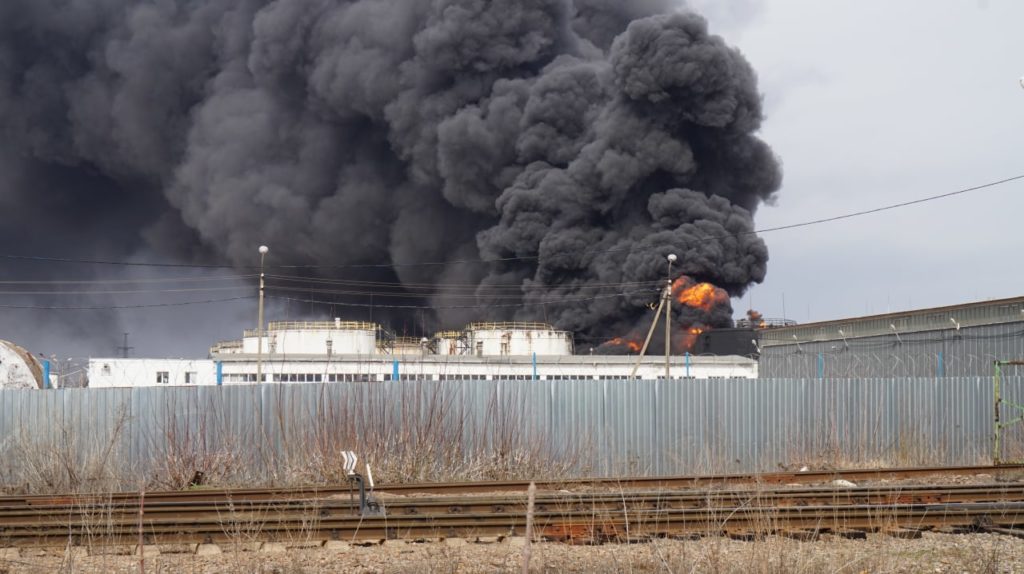
Aleksey Bobrov © Rossa Primavera News Agency
Public reaction
Despite the abundance of provocative fake news and comments on the Web under posts about the incident, the residents of Belgorod and the region reacted reservedly and did not show any panic.
A fake report about the introduction of a state of emergency in the Belgorod region was circulated on social networks. This inadequate information was refuted by the speaker of the Belgorod Regional Duma Olga Pavlova, who explained that the Regional Duma has no authority to introduce a state of emergency in the region.
In the first hours after the fire broke out, there was an influx of car owners at the gas stations. But the regional authorities reacted promptly to the situation, saying that there would be no problems with fuel.
“Rosneft has two oil depots in the region: in Belgorod and Gubkin. At the moment Rosneft is redistributing reserves from the base in Gubkin across the region. Taking into consideration the redistribution they have enough reserves for all the filling stations for 5 to 13 days,” the Governor of the Belgorod Region Vyacheslav Gladkov stated.
He also noted that all other gasoline suppliers are working normally. “All have their own tanks, bases and their own sources of supply. That is why gasoline is available at all gasoline stations of the region,” stressed Gladkov.
The Minister of the Russian Ministry of Energy Nikolay Shulginov also made a statement, hastening to assure consumers that the situation is under special control.
“The fire at an oil depot in Belgorod Region will not affect the region’s fuel supply and prices for consumers,” he wrote on the ministry’s Telegram channel.
Later there was information about the attack on a printing house in the village of Severny, which may have been located on the route of the Ukrainian army’s helicopters from the oil depot to the Ukrainian border.
“Yes, we were shelled, we are on the spot now… As the representatives of the Ministry of Emergency Situations, who came, told us it was helicopters and they were shooting from them,” a printing house employee told RIA Novosti journalists.
In addition, on the evening of April 1, it became known about an explosion near the villages of Nikolskoye and Yasnye Zori. TASS, citing a source in the law enforcement agencies, reported that the cause of the explosion was “a shell fired from the territory of Ukraine.”
Source: Rossa Primavera News Agency

